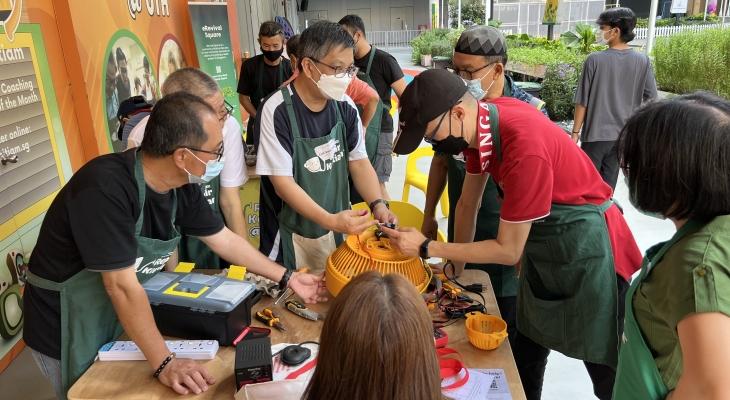 No time to read? Here’s a 30sec bite
No time to read? Here’s a 30sec bite
The island of Bali is set to face a ‘garbage emergency’ by 2025, as landfills overflow. Seventy per cent of Bali’s trash is organic waste, which can be turned into compost. Yet, mixed with plastic and other materials in the rubbish, they only add to the mountains of trash in teeming landfills, rendering what could be recycled unusable as well. Merah Putih Hijau (MPH) is a mentoring programme established by NGO Bumi Sasmaya Foundation to empower villages with knowledge and resources to take ownership of their waste. They work together with multiple stakeholders in creating a waste management system in the village, so more waste can be reused and recycled, and less trash goes to the overloaded landfills.
Separation a Solution
Indonesia is battling plastic waste pollution and a garbage crisis, but what if 80 per cent of waste can be repurposed instead of going into landfills? In Bali, a non-profit organisation is showing how this is possible, by going to villages with its Merah Putih Hijau (MPH) programme. The MPH solution, developed by environmental NGO Bumi Sasmaya Foundation, aims straight at the root cause of the island’s overflowing landfills by focusing on waste separation.
About 70 per cent of the waste in Bali that goes into landfills is actually organic waste that can be turned into compost. Left unsorted, organic waste is prevented from entering the natural cycle of decomposition, and when mixed with other waste, adding to mountains of garbage, gives off an unbearable stench, as well as leachate - toxic fluids that leach into and contaminate the soil and water.
With landfills teeming — especially worsened by the pandemic in the past two years — surrounding villages pay the price as they face social and health problems from the high levels of methane gas being emitted.
Getting Bali’s villages to own the process of waste separation — sorting waste into categories of organic, non-organics and residual waste — is Bumi Sasmaya Foundation’s answer to the problem. “The solution is our behaviour. When our behaviour can change, we can finally segregate waste properly, then slowly but surely, our problem with waste will vanish,” says Agaysta Yatra, who heads the foundation.
Sharing Social Responsibility
On different days of the week, colour-coded trucks — green, red-white or black — can be seen in certain villages in Bali, signalling to villagers the type of waste being collected.
MPH’s approach of managing waste separation shifts the responsibility to individuals in sorting waste in their households. The organic waste collected is then brought to a 3R-Transfer Depo (TPS3R) waste management facility, where it is used to produce quality compost that can be used by farmers for regenerative cultivation. At this stage, about 80 to 90 per cent of the waste that normally would end up in landfills have found a new purpose.
To achieve buy-in from villages, the foundation’s staff spend weeks, even months, understanding the unique needs of each village. “Using a socio-cultural approach, MPH aims to meet the village’s needs at where they are and journey with them,” says Agas.
With the involvement of the local governor and village heads, MPH also rallied residents into becoming eco-champions, educating, and raising awareness to the importance of waste separation in their communities.
Funded by donations, the foundation currently supports 15 villages across Bali, among them Pejeng and Taro — the latter has been hailed a success model for its harmonious partnership across multiple stakeholders.
“Our habits must change,” Agas says, stressing that a behavioural reset is the key in making a sustainable programme.
“Our goal is to build a circular economy. Where the economy can sustain itself, where 3R-Transfer Depo (TPS3R) or our mentoring system in the village can keep running on its own,” Agas shares, citing the hope to use this successful model to inspire other provinces to combat the garbage crisis in Indonesia together.
About Merah Putih Hijau (MPH)
Merah Putih Hijau is a mentoring programme established by environmental NGO Bumi Sasmaya Foundation in 2016 to empower villages in Bali with knowledge and resources to take ownership of their waste. They work with heads of villages, youth communities, women communities and schools to change the way these villages manage their waste.
Contributors
Producer & Writer
Executive Producer
Director & Camera
Widha P. Sugiarto
Director & Editor
Caecilia Sherina
Sound
Ananda Putri R
Colourist
Julius Pandu
Camera
I.B. Giri Semara Putra






